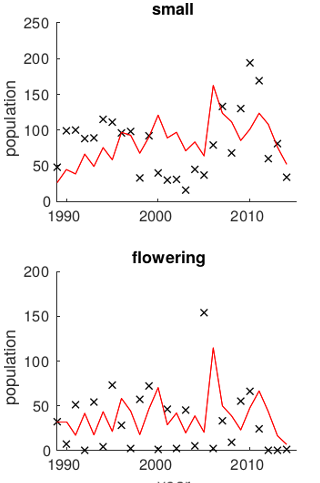
Prediction is a persistent challenge in ecology, particularly in connection with the frequency and quality of available data. We are interested in the statistical and dynamic tools that efficiently use available data, as well as how to design experiments to target specific hypotheses and model-fitting goals. I early work, we explored sampling strategies to minimize uncertainty in parameter estimates in greenhouse mesocosm experiments. Similar methods and concerns were also addressed as review, emerging from a workshop on transient dynamics. Recently, we have studied identifiability in an epidemiological context, as part of a mathematics resesarch community.
The key contribution of this work is in determining the conditions under which data can meaningfully inform mathematical models. We explore some of the following ideas:
Ongoing work on this project includes applying similar methods to experimental/data-driven problems as they arise.
